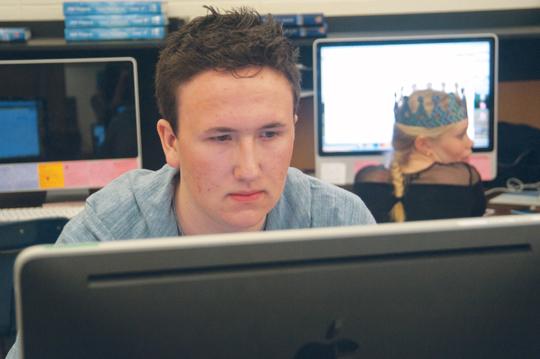After Derek Fisher, previous Current in Carmel managing editor, accepted sophomore Mark Tague as an unpaid intern at the newspaper, Tague began emailing Fisher at the beginning of each week for assignments. Tague conducted interviews, took photographs, wrote stories and submitted his work to Fisher via email. The stories were edited and published monthly in the Current.
Tague said he sought the unpaid internship position to gain experience in the field of journalism.
“The goal of any internship is to learn some life lesson or moral. I wanted experience, so I went there for it. By doing so, you focus on the little things about the position you are interning,” Tague said. “Internships are unforgettable since you are given a lot of trust.”

He is not alone. Other students here, as well as leaders at the Current in Carmel, said they believe unpaid internships provide a multitude of benefits.
Joseph Storm, Finish Line sales clerk and senior, said, “Unpaid internships give you experience and expose you to things you wouldn’t have seen in the job field you’re looking into. You really can’t get a paid job for the career you want to pursue in college. Internships are more enjoyable and enriching.”
The Current in Carmel has an active internship program for both paid and unpaid positions. Steve Greenberg, Current in Carmel co-founder, executive vice president and general manager, along with Brian Kelly, Current co-founder, president and publisher, both said that they believe it is important for them to provide an enriching experience to any students who seek an internship with their newspaper.
“We think it’s important to give them that opportunity. We’re able to help them build a portfolio, and in a few cases for high school students, helped them with their college applications. We’re doing our best for a small company to further the craft,” Greenberg said. “A lot of the kids, when applying for colleges, are already published writers. That goes to them as a feather in their cap.”
Kelly said, “Like any internship program, the intern gets out what he puts in.”
It is clear that many students and directors of internship programs see the benefits of such positions. However, recent debate has arisen over the legality of such unpaid positions. According to a recent TIME article, Manhattan law firm Outten & Golden filed a class action lawsuit against Hearst Corporation on behalf of unpaid interns who had worked at Harper’s Bazaar, a magazine owned by Hearst. Among other things, the lawsuit accuses Hearst of violating state and federal labor laws due to their treatment of unpaid interns.
Tague said he believes students here are unaffected by such issues.
“The legality is a gray area. I think it is up for interpretation on the student’s side,” he said. “The Current did not make me work overtime or anything I was uncomfortable with. I did it on my time and I made sure I had the time and resources to do it.”
Storm said, “There could be problems. Interns could be given meaningless tasks, but it really depends on who your mentor is. It isn’t really an issue for high school students.”
Kelly said the Current has had an active intern program at this school for six and a half years and has not yet had an issue.
“We’re not sending interns to write obituaries, open mail or fill coffee cups. We give real, hands-on experience,” he said.
Greenberg said, “We make it clear to (interns) that they’re welcome to participate but they have a clear understanding before they come in that it’s up to them.”
Greenberg said gaining experience is the key purpose of an unpaid internship position.
“If we have a chance to expose somebody to the craft and help him or her gain experience, that’s our way of paying it forward,” he said.
Tague said he learned more about the craft than simply reporting skills. He said he realized the high level of expectation required in professional journalism and learned to meet it, and believes his experiences will help him in college and in choosing his future career.
Tague said, “In high school, a lot of people are undecided on what they want to do. By doing any internship, they can lean towards or away from a subject, making it easier when you get to college and need to decide on a major.”




























![Keep the New Gloves: Fighter Safety Is Non-Negotiable [opinion]](https://hilite.org/wp-content/uploads/2024/12/ufcglovescolumncover-1200x471.png)
















































![Review: “We Live in Time” leaves you wanting more [MUSE]](https://hilite.org/wp-content/uploads/2024/12/IMG_6358.jpg)
![Review: The premise of "Culinary Class Wars" is refreshingly unique and deserving of more attention [MUSE]](https://hilite.org/wp-content/uploads/2024/12/MUSE-class-wars-cover-2.png)
![Introducing: "The Muses Who Stole Christmas," a collection of reviews for you to follow through winter [MUSE]](https://hilite.org/wp-content/uploads/2024/12/winter-muse-4.gif)
![Review: "Meet Me Next Christmas" is a cheesy and predictable watch, but it was worth every minute [MUSE]](https://hilite.org/wp-content/uploads/2024/11/AAAAQVfRG2gwEuLhXTGm3856HuX2MTNs31Ok7fGgIVCoZbyeugVs1F4DZs-DgP0XadTDrnXHlbQo4DerjRXand9H1JKPM06cENmLl2RsINud2DMqIHzpXFS2n4zOkL3dr5m5i0nIVb3Cu3ataT_W2zGeDAJNd_E-1200x884.jpg)
![Review: "Gilmore Girls", the perfect fall show [MUSE]](https://hilite.org/wp-content/uploads/2024/11/gilmore-girls.png)
![Review in Print: Maripaz Villar brings a delightfully unique style to the world of WEBTOON [MUSE]](https://hilite.org/wp-content/uploads/2023/12/maripazcover-1200x960.jpg)
![Review: “The Sword of Kaigen” is a masterpiece [MUSE]](https://hilite.org/wp-content/uploads/2023/11/Screenshot-2023-11-26-201051.png)
![Review: Gateron Oil Kings, great linear switches, okay price [MUSE]](https://hilite.org/wp-content/uploads/2023/11/Screenshot-2023-11-26-200553.png)
![Review: “A Haunting in Venice” is a significant improvement from other Agatha Christie adaptations [MUSE]](https://hilite.org/wp-content/uploads/2023/11/e7ee2938a6d422669771bce6d8088521.jpg)
![Review: A Thanksgiving story from elementary school, still just as interesting [MUSE]](https://hilite.org/wp-content/uploads/2023/11/Screenshot-2023-11-26-195514-987x1200.png)
![Review: "When I Fly Towards You", cute, uplifting youth drama [MUSE]](https://hilite.org/wp-content/uploads/2023/09/When-I-Fly-Towards-You-Chinese-drama.png)
![Postcards from Muse: Hawaii Travel Diary [MUSE]](https://hilite.org/wp-content/uploads/2023/09/My-project-1-1200x1200.jpg)
![Review: "Ladybug & Cat Noir: The Movie," departure from original show [MUSE]](https://hilite.org/wp-content/uploads/2023/09/Ladybug__Cat_Noir_-_The_Movie_poster.jpg)
![Review in Print: "Hidden Love" is the cute, uplifting drama everyone needs [MUSE]](https://hilite.org/wp-content/uploads/2023/09/hiddenlovecover-e1693597208225-1030x1200.png)
![Review in Print: "Heartstopper" is the heartwarming queer romance we all need [MUSE]](https://hilite.org/wp-content/uploads/2023/08/museheartstoppercover-1200x654.png)




